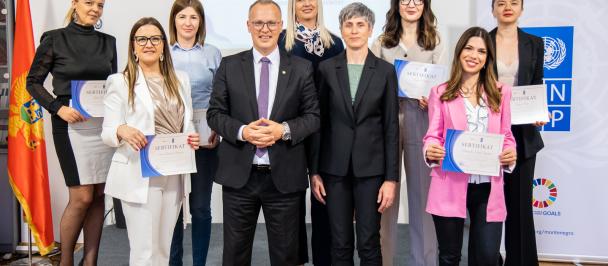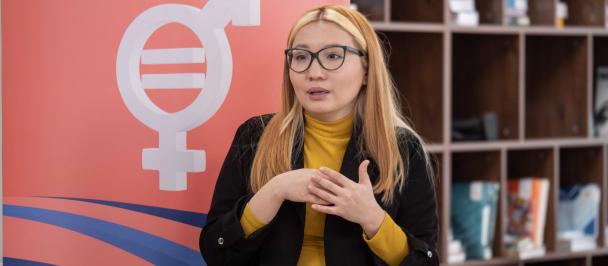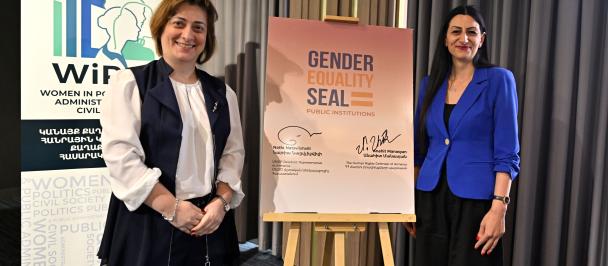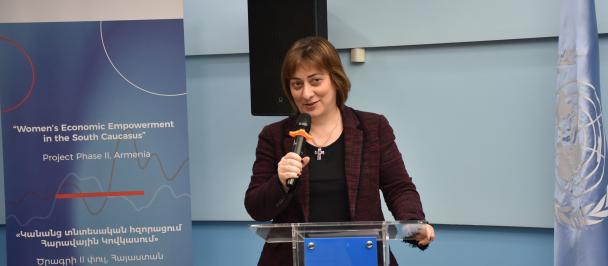Ministry of Justice, UNDP and UNFPA come together to launch new Canadian funded project
Government of Canada supports the new ‘Enabling Access to Justice for Victim Survivors of SGBV’ project
May 12, 2023
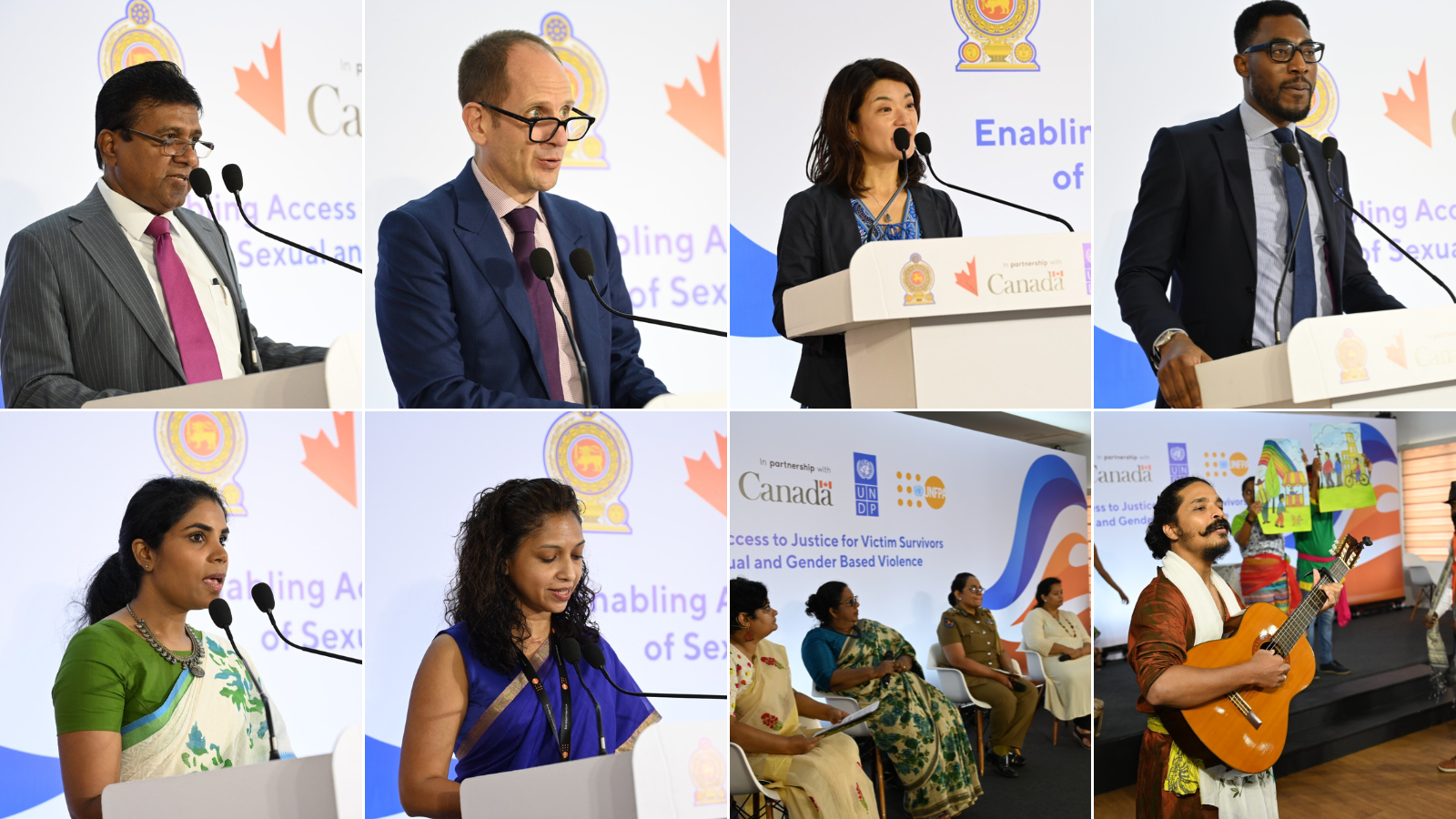
Representatives speaking at the launch of the new project
Colombo, Sri Lanka, 12 May 2023: Despite national policy achievements, violence against women in Sri Lanka is pervasive and exists in the family, the workplace and the community. This is largely due to prevailing inequality between genders steeped in social norms and women being socially and economically disadvantaged.. 1 in 5 (20.4%) women in Sri Lanka have experienced sexual and/or physical violence by an intimate partner in their lifetime; and 1 in 4 women (24.9%) have experienced sexual and/or physical violence since the age of 15 (UNFPA, 2019). But only over one third (37.3%) and one fifth (21.6%) of victims sought support respectively from the police and health care centres.
To bring about a justice sector approach to addressing sexual and gender-based violence (SGBV) against women and girls, and gender minorities in the country, the United Nations Development Programme (UNDP) in coordination with the United Nations Population Fund (UNFPA) in Sri Lanka working together with the Ministry of Justice (MoJ) will design and implement the ‘Enabling Access to Justice for Victim-Survivors of Sexual and Gender Based Violence (SGBV) in Sri Lanka’ project with funding from the Government of Canada. The five-year project launched today will empower women, girls and gender minorities, including victim survivors of SGBV to access justice, demand and receive better services, and work towards a society free of SGBV.
The proposed interventions of the project aims at creating transformative change through a whole of country approach working together with key stakeholders in the formal justice system and law enforcement. These efforts will be supplemented by working with the health and medical sectors, and ministerial agencies on women’s affairs, while also working closely with civil society organizations, primarily women’s rights organizations (WROs) at national level, and ensuring outreach by working with WROs from across the country at a district, divisional and community level.
To mark the commencement of the project, a launch event took place this morning with the participation of high-level representatives from the partner organizations and multi-sectoral stakeholders that will be engaged through the project. Speaking at the event, Hon. Wijeyadasa Rajapakshe PC, Minister of Justice stated, “Victims not only suffer by the offender, but also by society at large. Hence, if no equal and quick reparation is available under the justice sector starting from the initial complaint, it is a great shame. As the main stakeholder of the justice system, judiciary, legal counsel, investigators, quasi-judicial officers and family counsellors, we have a great responsibility cast upuon our shoulders in ensuring these victims are safeguarded.”
The project is designed and will be delivered within the framework and guidance of the Government of Canada’s Feminist International Assistance Policy (FIAP) which commits to contribute to global efforts to eradicate poverty around the world by addressing inequality, taking into special consideration empowerment of women and girls to reach their full potential to earn their own livelihoods, which will benefit families as well as the economic growth of their communities and countries.
H.E. Eric Walsh, High Commissioner for Canada in Sri Lanka and Maldives noted that support to this initiative in Sri Lanka is part of Canada’s broad policy commitment to addressing unacceptably high rates of sexual and gender-based violence (SGBV) globally.
Through partnerships and collaborations with multi sectoral stakeholders, the project will operationalise new and innovative approaches, engaging men and boys to prevent SGBV, while enabling gender responsive legal aid, a post-shelter economic support programme and breaking the bias on underlying behaviour and norms within the society. Sensitive and practical legal and support systems will set in place approaches that are proven effective, yet new to Sri Lanka .
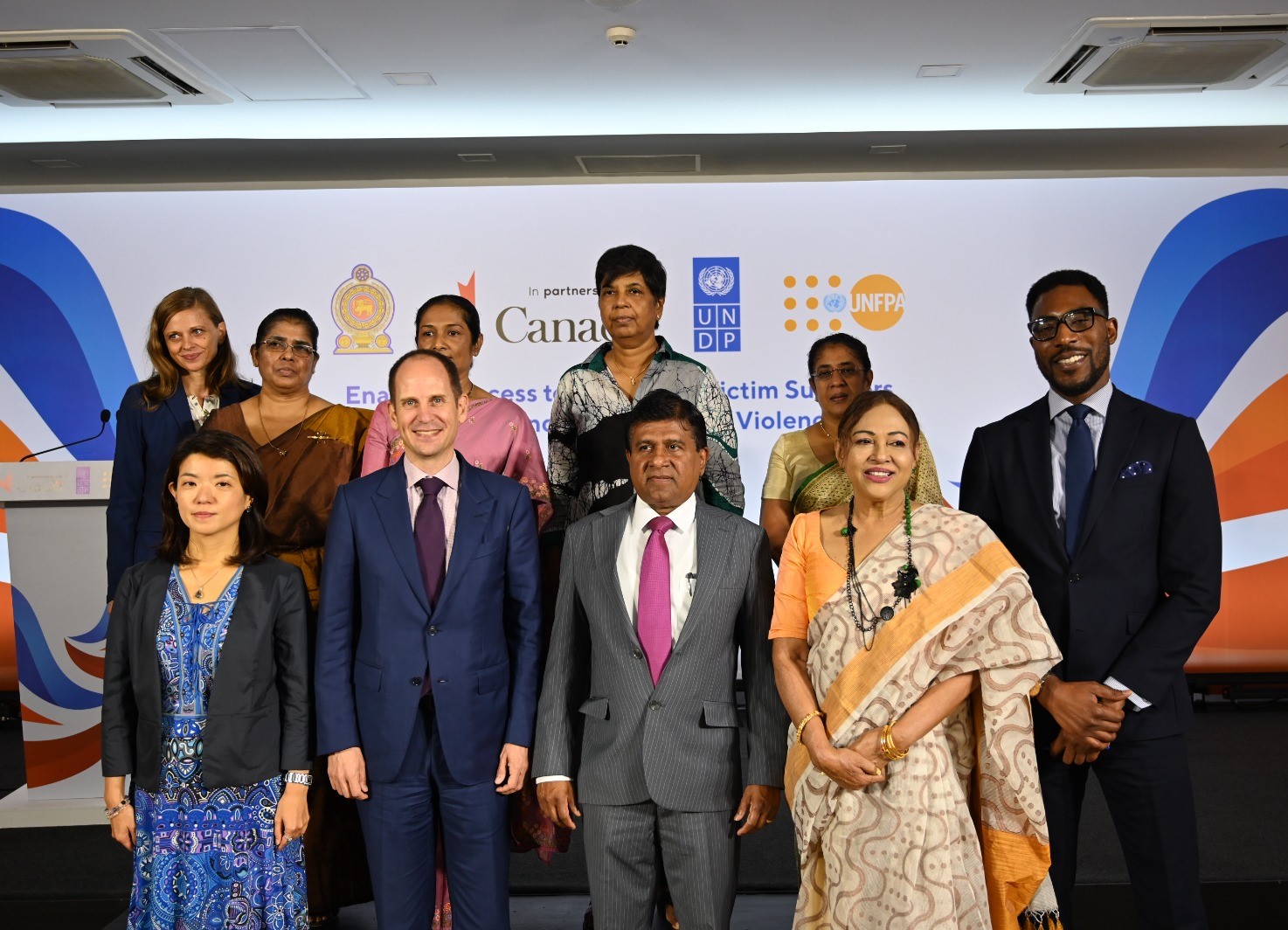
Hon. Wijeyadasa Rajapakshe PC, Minister of Justice; H.E. Eric Walsh, High Commissioner for Canada in Sri Lanka and Maldives; Ms. Azusa Kubota, Resident Representative, UNDP in Sri Lanka; Mr. Kunle Adeniyi, UNFPA Representative for Sri Lanka and Country Director for the Maldives; Members of the Women's Parliamentary Caucus and other representatives from partner organizations
Highlighting UNDP’s lead role in pushing this agenda, Ms. Azusa Kubota, Resident Representative, UNDP in Sri Lanka stated, “This project will build on UNDP’s global experience in addressing the SGBV and ongoing initiatives in supporting the justice sector in Sri Lanka. We are grateful for this multistakeholder partnership that brings the Ministry of Justice, justice sector institutions, civil society actors and UNFPA, with the funding support of the Government of Canada. This project will allow us to apply a wholistic set of tools. We must promote a collective responsibility to deliver better services for the most vulnerable and marginalized victims, and further build partnerships to comprehensively address SGBV through the overall empowerment of women.”
The project serves as an instrument to bring the efforts currently invested with Sri Lanka’s Multisectoral SGBV Action Plan 2016-2020, supported by UNDP in line with Canada’s policy, and its ongoing review led by UNDP and UNFPA, while also framing its work within the commitments of the Sri Lanka Gender Equality and Women’s Empowerment Policy being formulated by the Ministry of Women’s Affairs with oversight from the Parliamentary Select Committee on Gender Equality supported by UNFPA.
Speaking to the importance of this project, Mr. Kunle Adeniyi, UNFPA Representative for Sri Lanka and Country Director for the Maldives noted, “This project adopts a survivor centric approach, where women and girls are provided with the essential protection and care services that limit their vulnerability to violence and ensure they have access to the necessary care and support that is essential for maintaining their health and dignity as well as providing a critical element for access to justice for survivors of violence ”
Resulting from wide consultations that have taken place, the new ‘Enabling Access to Justice for Victim-Survivors of Sexual and Gender Based Violence (SGBV) in Sri Lanka’ project has been designed to be victim survivor-centric and is anchored in the pillars of enforcement, services and prevention. With an ambition to make the justice pathway safe, inclusive and equipped to enforce policies and provide access to justice to victim survivors; the project seeks to ensure that service providers are capacitated- with resources to provide better services to victim survivors; and to address harmful social norms through prevention measures informed by diverse voices. Thus, creating agency for women, girls and gender minorities to access the justice system and live a life free from the threat and fear of violence.
***

 Locations
Locations
